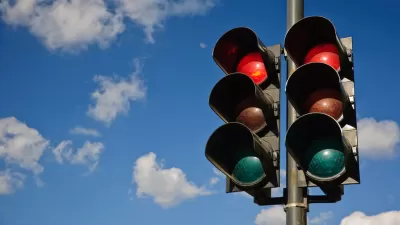After completing an eight-year study of traffic collisions, the Seattle Department of Transportation realized that one way to immediately improve traffic safety would be to improve signalization an key intersections.

Ryan Packer reports on a new commitment in Seattle to reprioritize traffic light replacements as a component of the Seattle Department of Transportation's (SDOT) Vizion Zero initiative. Here Packer sets the context:
When the Seattle Department of Transportation (SDOT) announced the end of an eight-year study on traffic collision data, it had a very comprehensive set of data on where collisions took place, what modes were involved, and how the collisions occurred. The big question was: how would the department begin to apply the data across the city to reduce those collisions?
Packer follows up a post on the SDOT Blog announcing that the agency has targeted traffic signalization as a priority project in response to the data produced by that study. "Not only will they be using that more robust set of data to determine where to add signals, they will also be prioritizing the improvement of existing traffic signals to improve the left turn movements," according to Ryan Packer. SDOT has already identified ten highest priority intersections for new traffic signals. According to Packer, the whole process reflects "a big step toward a data-driven approach to the day-to-day business that SDOT engages in all the time: routine maintenance, system upgrades, and safety improvements."
FULL STORY: SDOT To Reprioritize Traffic Light Replacement

Planetizen Federal Action Tracker
A weekly monitor of how Trump’s orders and actions are impacting planners and planning in America.

San Francisco's School District Spent $105M To Build Affordable Housing for Teachers — And That's Just the Beginning
SFUSD joins a growing list of school districts using their land holdings to address housing affordability challenges faced by their own employees.

The Tiny, Adorable $7,000 Car Turning Japan Onto EVs
The single seat Mibot charges from a regular plug as quickly as an iPad, and is about half the price of an average EV.

Seattle's Plan for Adopting Driverless Cars
Equity, safety, accessibility and affordability are front of mind as the city prepares for robotaxis and other autonomous vehicles.

As Trump Phases Out FEMA, Is It Time to Flee the Floodplains?
With less federal funding available for disaster relief efforts, the need to relocate at-risk communities is more urgent than ever.

With Protected Lanes, 460% More People Commute by Bike
For those needing more ammo, more data proving what we already knew is here.
Urban Design for Planners 1: Software Tools
This six-course series explores essential urban design concepts using open source software and equips planners with the tools they need to participate fully in the urban design process.
Planning for Universal Design
Learn the tools for implementing Universal Design in planning regulations.
Smith Gee Studio
City of Charlotte
City of Camden Redevelopment Agency
City of Astoria
Transportation Research & Education Center (TREC) at Portland State University
US High Speed Rail Association
City of Camden Redevelopment Agency
Municipality of Princeton (NJ)




























